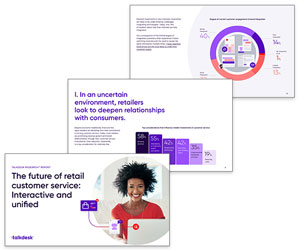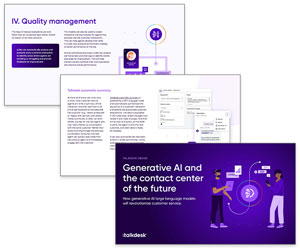Here are ten good real-life customer service examples that show teams really going the extra mile for their customers, giving them the best possible experience.
1. Performing a Random Act of Kindness
In this exceptional customer service example, a customer wrote to the HomeServe contact centre to ask whether he could reduce the price of his policy at renewal. One of the company’s retention reps then got in touch with the customer and, during the call, found out that he was soon to be 100 years old.
With this in mind, the advisor decided that she wanted to do more, so she talked to members of the team who were in charge of looking after HomeServe’s vulnerable customers as part of the company’s “CustomerFirst” initiative. Together, the team decided to mark the occasion by giving the customer a free HomeServe Cover8 policy for life.
The advisor then got back in touch with the customer to let him know of the great news and wish him a happy birthday. But her kindness didn’t end there. As well as sending him a “Random Act of Kindness” card, she also arranged with CustomerFirst for a birthday card to be sent to him.
Blown away by the generosity, the customer phoned the advisor to thank her personally for everything she’d done. The advisor had taken HomeServe’s “Dare to Care” initiative to a whole new level.
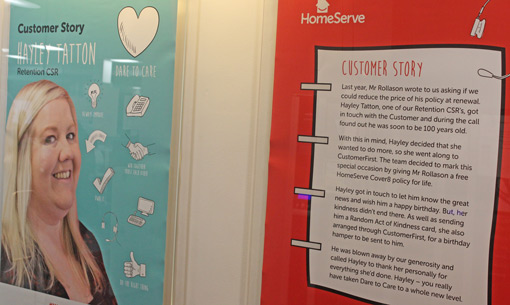
Great customer stories like this are displayed on HomeServe’s contact centre walls
Thanks to the Contact Centre Team at HomeServe
For more from HomeServe, read our article: 12 Ideas Taken From HomeServe’s Contact Centre
2. Phoning Customers Who Are Running Late in Collecting Their Parcels
In this example, a customer purchased a portable mini-speaker from an online store and opted to collect it from the warehouse at the weekend. En-route to the warehouse, she realised she had her times wrong. The warehouse was closing at 12:00 not 13:00, as she’d thought.
Realising she was still 15 minutes away at 11:55, the customer tried to phone the contact centre. There was no answer and so the customer resigned herself to her mistake. Two minutes later, her cellphone rang. It was the call centre. They’d picked up a dropped call and wondered if they could assist.
The customer explained the situation, asking to confirm if the warehouse was in fact closed. The call centre advisor confirmed that this was true.
However, the advisor didn’t leave it there. She asked the customer to hold while she found out if the warehouse dispatch would be willing to wait so that the customer could collect her purchase. They would!
It was 12:35 by the time she pulled up to the warehouse. Twice during this time, the advisor had phoned back to find out if the customer was getting there accurately. She even helped with directions when the customer got lost.

Carolyn Blunt
The warehouse man was waiting outside with the package. He greeted the customer with a smile and when she thanked him for staying and waiting for her, his response was: “It’s a pleasure. Only happy to help!”
The exceptional customer service didn’t stop there. The advisor called back a third time to ensure the customer had been able to collect her package. The contact centre advisor went above and beyond the call of duty.
Thanks to Carolyn Blunt at Ember
To find out more about this, read our article: An Example of Great Customer Service
3. Recognising Customer Emotions and Being Supportive
Sometimes, it’s not just about an individual advisor going the extra mile for the customer, but a customer service team coming together in the best interests of the customer.
Sometimes, it’s not just about an individual advisor going the extra mile for the customer, but a customer service team coming together in the best interests of the customer.
LV did just that for a customer whose family had lost a number of precious items in a fire. For the customer, one of the items was a signed album by the band James.
So the customer care team at LV sent the customer another copy of the album, along with a signed poster and a handwritten card, as can be seen below.
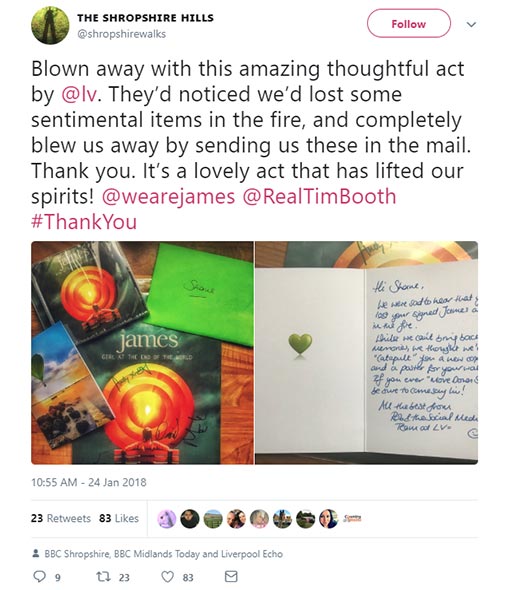
Find the original tweet by clicking here
When writing a letter to a customer, it is a nice touch to do it by hand. This is because no matter how well formed the letter is, the customer will always be suspicious that the contact centre will have use some sort of template. However, a handwritten letter is a great way of personalising a service to each individual customer and show them that they are valued.
4. Turning Around a Negative Experience
This example highlights the need to treat everyone as an individual and involves the contact centre for a local council leisure group.
When the customer nervously called up to make a complaint, the advisor could tell by his tone of voice that this was not something he’d decided on flippantly, he was genuinely distressed.
The customer said that he felt that a member of staff in the leisure centre had not treated him with respect and had lost patience with him when he had tried to sign up for a gym membership, resulting in him leaving the leisure centre upset and reluctant to return.
The advisor identified at the start of the call that this gentleman had a significant stammer and the basis of the complaint was due to the member of staff, who had added to his already anxious state because of his condition.
The advisor then made it their responsibility to try to reassure and make amends with this customer. They took an account of what had happened at the centre and used their fact-finding skills to successfully deduce who had handled the customer sign-up. From this, the advisor was able to escalate to the relevant centre manager for further action.
The customer stated that using the gym facilities was one of the only recreational activities he had the confidence to do due to his anxiety over his stammer.
He also said that he had been a “pay as you go” customer for a while and had tried to sign up to a membership, as he was gaining more confidence and was attending more frequently.
The advisor immediately offered to sign him up over the phone to save him going back into the centre and being embarrassed any further.
The customer called through a few days later and asked specifically to speak to the same advisor. He thanked them and also said that the manager at the centre had personally apologised to him and he had since been made to feel very welcome during his visits to the centre.
5. Taking Ownership of Another Colleague’s Mistake
While this story is not contact-centre specific, it demonstrates how a customer service representative can take control of a colleague’s error and properly handle a customer’s issue.
This example revolves around a customer called Tina:
Tina was driving home when she decided to stop at McDonald’s for breakfast. She drove up to the drive-through window and ordered coffee and two Egg McMuffins without any meat.
Tina looked at the receipt, which indicated the order was correct, and drove off. Once on the highway, she opened her Egg McMuffin to find a sausage patty had been substituted for the Canadian bacon. In other words, it had meat. She was disappointed and hungry.
Then she saw a sign advertising another McDonald’s at the next exit and decided to try her luck at this location. Rather than go through the drive-through lane, she went inside to place her order. She explained what happened and showed the young man working the counter her receipt. He was friendly, sympathetic and apologetic, and without hesitation gave Tina two meatless McMuffins – and didn’t charge her for them.

Shep Hyken
Maybe the McDonald’s were owned by the same people, or maybe they weren’t. It doesn’t matter. One covered for the other’s mistake. And the way they went about it was textbook perfect. The employee at the second McDonald’s didn’t make excuses. He only apologised, smiled and took care of the customer.
The lesson here for the contact centre is that no matter what department an error occurred in, to avoid saying something along the lines of “We don’t deal with that”. Take ownership of the issue and instead say, “It sounds like you need [X department]. I’ll just transfer you/find you the number.”
Thanks to Shep Hyken
For full details of this story, read our article: The Rising Tide Lifts All Boats: A Customer Service Story
6. Working Closely With Other Departments to Create Great Experiences
To create the best possible experience, FatFace’s contact centre holds close ties with other departments, including marketing, creative and design. The fact that each of these departments is located within one building helps improves the ease of communication.
One example of how these relationships enabled a FatFace team member to go the extra mile was when a customer contacted the organisation to say that even though she loved a FatFace blouse that she had recently bought, she was self-conscious about wearing it. This was because of her recent mastectomy.
Wanting to go the extra mile for the customer, the FatFace team member who had interacted with the customer got in touch with the company’s design team. The design team were then able to create some specialised scarves that the customer could wear with the blouse and hide any sign of her recent operation.
Thrilled with the outcome, the customer got in touch with the contact centre and thanked the team for their efforts, compassion and support. This message was sent to the team as part of a card, which can be found below.
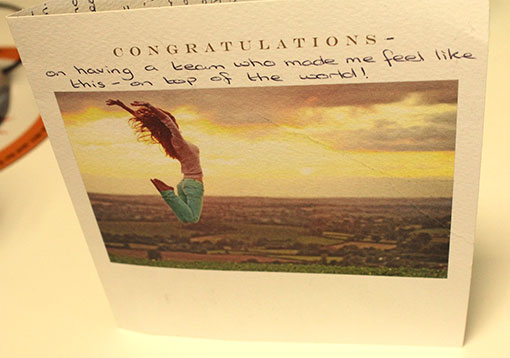
This is a thank-you card that was sent to FatFace’s contact centre
Thanks to the Contact Centre Team at FatFace
For more from Fat Face, read our article: 14 Successful Initiatives From Fat Face’s Contact Centre
7. Finding Outside Help
Often, when advisors go the extra mile it is to help a customer who faces physical issues with a product, meaning that the advisor has to adapt their approach in order to minimise the customer’s problems. This was certainly the case for an advisor at Sure Petcare’s contact centre.
The advisor in question spoke to client, who was unable to retrofit the replacement part of a product sent to her by Sure Petcare.

Sarah Metcalfe
Realising the customer’s trouble finding somebody to help her, the advisor called around and found a local handyman and covered the cost to upgrade the product for the customer.
In addition, the advisor took ownership of the customer’s issue and covered the customer’s bill for the handyman. This was because the customer was elderly and had no friends or family living near them.
Thanks to Sarah Metcalfe at Sure Petcare
8. Sending a Personal Apology
When a Delta Air Lines flight was diverted to an alternative destination due to heavy snowfall, the company responded by sending a personalised apology email to passengers. An example of one of the emails sent is highlighted below.
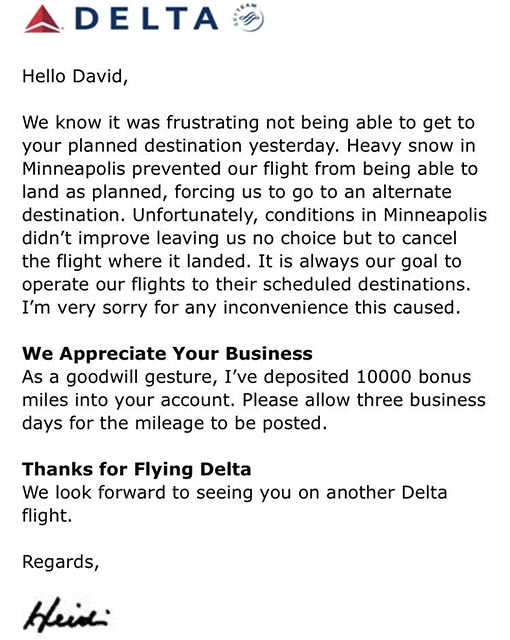
Find the original tweet by clicking here

Charlie Mitchell
The email was an good example of exceptional customer service, as it acknowledged the customer’s frustration, while the writer took personal ownership of the problem – saying “I’m very sorry” – and offered a goodwill gesture.
This email was met with a great response by the airline’s understandably frustrated passengers. One such passenger, David Mortensen, tweeted: “@Delta just another example to appreciate great customer service. Can’t control Mother Nature but you can improve outcomes. #gracious”.
Thanks to Charlie Mitchell, former editor at Call Centre Helper
8. Offering an Emergency Same-Day Delivery
One of Echo-U’s executive desk team received a complaint that had been directly sent to their Director. Upon receiving the request, it was obvious that the customer felt he had been misled by the information given to him by an advisor.
On first glance of the complaint, it seemed that the advisor was indeed in the wrong, but when the company looked into this further, it was an unavoidable technical error with the driver’s Sat-Nav that caused the non-delivery of his very important parcel. This parcel included shoes for a groom who was getting married the next day.

Mandy Holford
Once the company got to the bottom of this, after speaking with the depot and driver, the original advisor organised for the customer to receive the delivery on the same day as the complaint was raised.
After all, the company wouldn’t want the groom to go without his shoes on his special day! To add a little goodwill gesture, some chocolates were also sent.
Although, on first contact, the consumer was angry, after the exceptional customer service given by the advisor, who understood the urgency and took accountability for the case, the customer understood and accepted the apology. Overall, he was happy with the service provided in an emergency situation.
Thanks to Mandy Holford at Echo-U
10. Finding On-the-Spot Solutions
As a contact centre advisor, it’s important to adapt to the needs of a customer. An example of this, from the LeadStream contact centre, is how a member of their team responded to a customer with a hearing impairment.
On calling, the advisor learned that the customer was unable to continue with their enquiry over the phone. The advisor proceeded to find a broker who was happy to deal with the customer via email alone and explained the situation. The customer was then able to continue with their life insurance enquiry in the way they found most accessible.
While many of these examples have centred around helping those with disabilities, the lessons can be transferred across the entire customer base, to create the best possible customer experiences.
Thanks to Mike Parks at LeadsStream
For more on how to write an exceptional customer service email, read our article: 10 Top Tips to Improve Email in the Call Centre
Find more inspiration for how you can deliver exceptional customer service by reading our articles:
- What Is Exceptional Customer Service?
- How to Achieve Excellent Customer Service Through Coaching
- The Top 100 Excellent Customer Service Quotes
Author: Charlie Mitchell
Reviewed by: Jonty Pearce
Published On: 2nd May 2018 - Last modified: 24th Jul 2024
Read more about - Customer Service Strategy, Carolyn Blunt, Charlie Mitchell, Customer Service, Ember, Mandy Holford, Mike Parks, Shep Hyken












